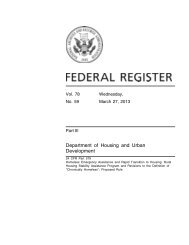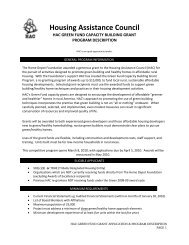Public Relations Guide for Rural Housing Organizations (manual
Public Relations Guide for Rural Housing Organizations (manual
Public Relations Guide for Rural Housing Organizations (manual
You also want an ePaper? Increase the reach of your titles
YUMPU automatically turns print PDFs into web optimized ePapers that Google loves.
Get the names, titles, addresses, and phone numbers of important people in the community.Look up radio and television stations in the phone book or on the web and call them to findtheir talk-show hosts, news directors (radio) or producers. Read local newspapers to find outwhich reporters might be interested in your issues. If there is a local magazine that might beinterested in your work, put the editor or a relevant staff writer on your list. Use e-maildiscussion lists and newsletter editors to get names. Include any public affairs staff from localbanks – they are usually very interested in community affairs – especially if they are banks withwhich you do business.Keep your list current; the news business experiences a heavy turnover rate. It does not makea good impression if you have not kept up with recent changes.If your organization has a newsletter, make sure that the most important potential mediacontacts all receive it (free of charge, if there is usually a fee <strong>for</strong> a subscription). Do nothesitate to provide free copies, even if your newsletter is relatively casual or comes outinfrequently. The more times the media see your organization’s name in print, the more youare helping your cause.Build <strong>Relations</strong>hips.This aspect of PR work should be constant. If you have never done PR work in yourcommunity, talking about the history of your issues in the community with reporters andmedia contacts would be a way to establish rapport.Cultivate ReportersThe first step in cultivating relationships with journalists is to know who is covering yourissues. Getting to know people who do media work will lead to a good understanding of themedia’s role in the community as well as in<strong>for</strong>m you of what enables the media to work betterwith you.“The success of your media strategy will largely depend on contacts with reporters, assignmentdesk editors, and other media representatives. Never underestimate the importance ofmaintaining good media contacts” (Bonk and Sparks 1991, 25). Send a cover letter initiallythat introduces the organization and individual contact. <strong>Organizations</strong> in smallercommunities should also attempt to introduce themselves to the editor of the editorial page.Sometimes it works to invite the press to your office <strong>for</strong> a roundtable discussion (not really apress conference), especially if you are attempting to establish interest in an issue in yourcommunity.Phone each reporter every time you send out a press release or a media advisory. Help them dotheir jobs – provide them with quotes, photos, facts, or anything else they need at the time theyspecify. When phoning, be sensitive to the time of day; try to reach them when they are notfacing a daily or weekly press deadline. You can always verify that the time is convenient <strong>for</strong>the reporter by starting the conversation with the question, “Is this a good time to talk?” Even<strong>Housing</strong> Assistance Council 11









